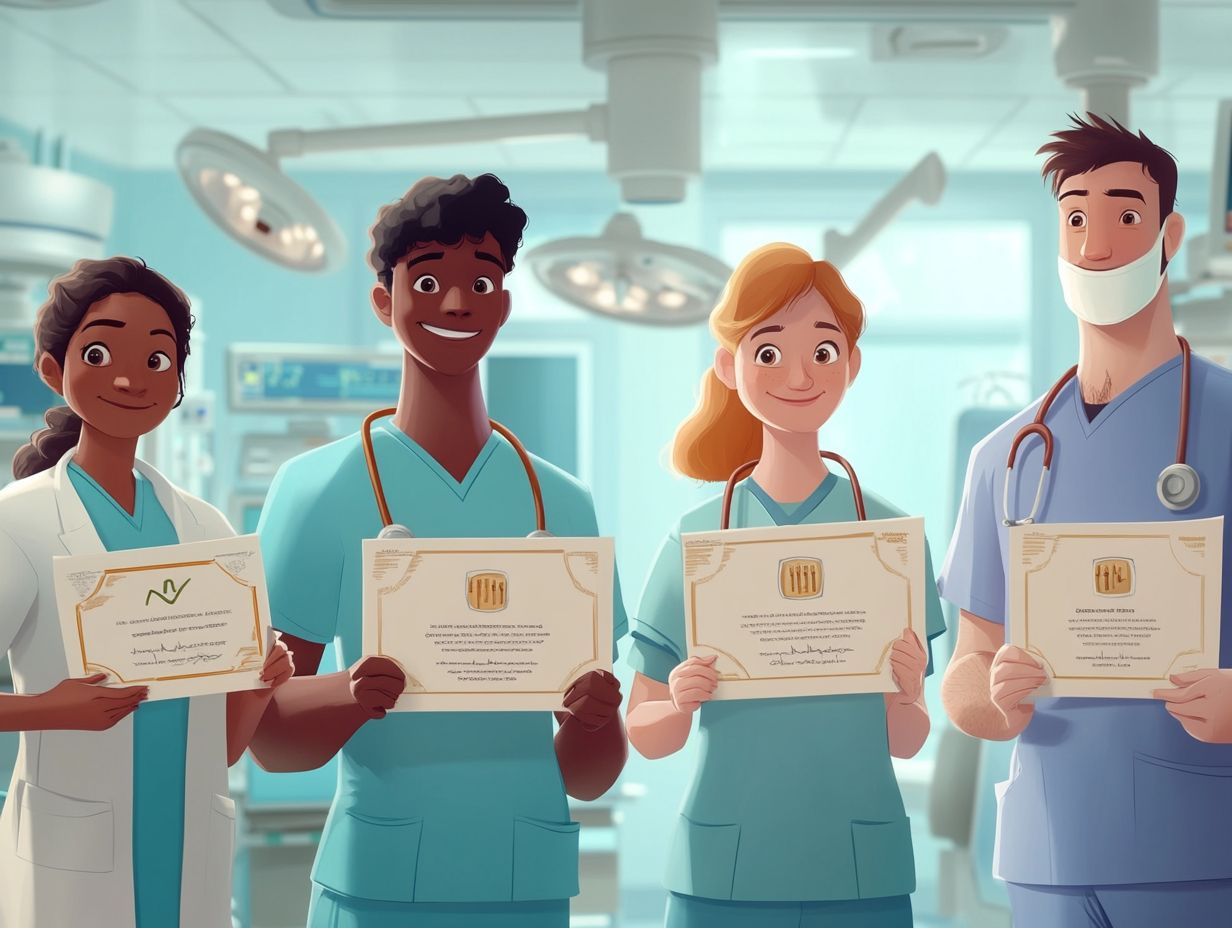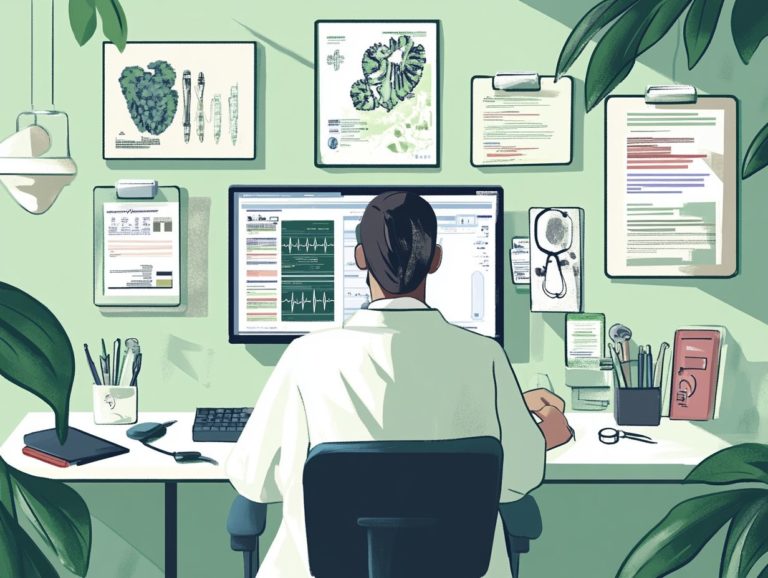7 Certifications Every Healthcare Professional Should Have
In the ever-evolving realm of healthcare, staying updated with essential certifications is vital for you, a healthcare professional, if you aim to provide the best possible patient care.
This article delves into seven crucial certifications that every healthcare worker should consider, such as Basic Life Support (BLS), Advanced Cardiovascular Life Support (ACLS), and Pediatric Advanced Life Support (PALS).
You ll discover the significance of these certifications, the requirements for obtaining them, renewal timelines, costs, and the numerous benefits they bring. Whether you re a seasoned professional or just embarking on your journey, understanding these credentials can significantly enhance your skills and career prospects.
Contents
- Key Takeaways:
- 1. Basic Life Support (BLS)
- 2. Advanced Cardiovascular Life Support (ACLS)
- 3. Pediatric Advanced Life Support (PALS)
- 4. Cardiopulmonary Resuscitation (CPR)
- 5. First Aid Training
- 6. Infection Control Certification
- 7. HIPAA Compliance Training
- Why Are These Certifications Important for Healthcare Professionals?
- What Are the Benefits of Having These Certifications?
- What Other Certifications Can Healthcare Professionals Consider Obtaining?
- Frequently Asked Questions
- What are the 7 certifications every healthcare professional should have?
- Why is it important for healthcare professionals to have these certifications?
- Are these certifications only required for doctors and nurses?
- How often should these certifications be renewed?
- Are there any other certifications that healthcare professionals should consider?
- Can these certifications be obtained online?
Key Takeaways:

- BLS, ACLS, and PALS are essential certifications for healthcare professionals, providing critical skills for emergency situations.
- CPR and first aid training are crucial for all healthcare professionals to ensure they can respond to emergencies with confidence and competence.
- Certifications in infection control and HIPAA compliance ensure healthcare professionals create a safe environment, protecting both patients and themselves.
1. Basic Life Support (BLS)
Basic Life Support (BLS) is an essential certification that equips you with the vital skills and knowledge necessary to respond effectively to emergencies. This ensures patient safety and enhances the quality of healthcare across various settings.
Through this rigorous training, you ll discover a range of CPR techniques, including chest compressions and rescue breaths. It highlights the critical importance of timely intervention in life-threatening situations.
This course prepares you to act swiftly and integrates seamlessly with other healthcare certifications, such as ACLS and PALS.
Typically, training spans a few hours to a couple of days, depending on the level of certification, allowing you to quickly add this critical skill set to your professional repertoire.
With median pay for certified professionals often reflecting their advanced capabilities, BLS training serves as a foundational step for you if you aim to advance within the broader healthcare career landscape. Ultimately, it fosters a more responsive and well-prepared healthcare community.
2. Advanced Cardiovascular Life Support (ACLS)
Advanced Cardiovascular Life Support (ACLS) is an elite certification tailored for healthcare professionals who find themselves at the forefront of emergency response and critical care situations.
This program builds upon your foundational BLS skills, enabling you to effectively manage complex cardiovascular emergencies.
In this course, you’ll dive deep into essential topics like medications, where you ll learn to administer crucial treatments such as epinephrine and amiodarone during cardiac events.
You ll also explore the vital art of recognizing irregular heartbeats, allowing you to swiftly and accurately distinguish between various heart rhythms.
Advanced airway management techniques are integrated into the training, equipping you with the necessary skills to secure a patient s airway during critical moments.
By mastering these components, you not only elevate your technical proficiency but also make a significant impact on patient outcomes. This underscores the pivotal role of ACLS in the ongoing development of your capabilities in life-saving interventions.
3. Pediatric Advanced Life Support (PALS)
Pediatric Advanced Life Support (PALS) is an essential certification designed to equip you with the knowledge and skills needed to respond effectively to pediatric emergencies, ensuring high-quality care for children in critical situations.
During this specialized training, you ll learn to navigate the complexities of caring for young patients, understanding that their physiological responses and emotional needs differ significantly from those of adults.
The curriculum places a strong emphasis on family-centered care, recognizing that the involvement of family members can significantly influence a child’s recovery process.
PALS addresses specific emergencies such as respiratory distress, cardiac arrest, and trauma, focusing on timely intervention and effective communication.
By honing these skills, you can enhance healthcare outcomes and provide reassurance to parents during some of the most challenging moments in their children’s lives.
To further enhance your career, consider enrolling in one of these certification courses today and take a significant step towards becoming a more prepared healthcare professional.
4. Cardiopulmonary Resuscitation (CPR)
Cardiopulmonary Resuscitation (CPR) is an essential life-saving technique that everyone should master, whether you’re a healthcare professional or a concerned layperson. Its critical role in emergency response and patient safety during cardiac emergencies cannot be overstated.
To effectively implement CPR, you will undergo rigorous training that includes hands-on practice using mannequins and real-life scenarios. This ensures you gain practical experience. Certification requirements may vary, but they typically involve passing both written and practical examinations to validate your skills.
Staying current is key; periodic updates to CPR guidelines reflect advancements in research and technology, making continuous education essential for anyone certified.
Mastering CPR is vital not only within hospital walls but also in settings like schools and workplaces. This skill can significantly impact survival rates, highlighting the importance of CPR in enhancing patient outcomes across various environments.
5. First Aid Training

First Aid Training equips you with essential skills to provide immediate care during emergencies, enhancing your readiness for a variety of healthcare roles.
Throughout this training, you ll explore crucial topics such as effective wound care techniques, enabling you to manage injuries swiftly and lower the risk of infection.
You ll also gain insights into shock management, learning how to stabilize patients and identify life-threatening conditions quickly.
Recognizing signs of severe illness can save lives. Your training makes you a crucial first responder in emergencies.
Mastering these skills fosters patient-centered care and ensures compliance with healthcare regulations. This compliance is crucial for upholding high safety and quality standards within the healthcare environment.
6. Infection Control Certification
Infection Control Certification is essential for healthcare professionals, emphasizing effective methods to prevent and control infections in healthcare settings. This focus significantly boosts patient safety and ensures compliance with healthcare regulations.
With the reduced effectiveness of antibiotics due to overuse and hospital-acquired infections presenting substantial challenges, robust infection control practices are more crucial than ever.
By adopting evidence-based strategies, you enable your healthcare team to identify and mitigate risks while fostering a culture of continuous quality improvement. Incorporating the latest research and trends into your protocols keeps you at the forefront of safe practice.
The certification process plays a vital role in your ongoing education, equipping you with the tools and knowledge to navigate the complexities of infection management effectively.
7. HIPAA Compliance Training
HIPAA Compliance Training is essential for healthcare professionals, ensuring adherence to regulations that protect patient confidentiality and manage healthcare information technology systems securely.
This training covers critical elements, including a deep understanding of patient rights, empowering individuals to control their personal health information.
You ll learn how to implement robust data security measures that protect sensitive information from unauthorized access. Non-compliance could lead to significant fines and legal repercussions, jeopardizing your organization’s reputation.
Staying informed about the latest HIPAA guidelines and best practices is essential for maintaining compliance and cultivating a culture of privacy and security within your healthcare environment.
Why Are These Certifications Important for Healthcare Professionals?
Healthcare certifications are essential for you as a professional in the healthcare industry. They enhance your skills, elevate the quality of patient care, and can be achieved through 7 steps to achieving your healthcare certification, broadening your job opportunities within the expansive healthcare system. This contributes to superior healthcare quality management.
These certifications are more than just credentials; they powerfully testify to your expertise and significantly enhance your credibility in a competitive job market. Studies indicate that certified healthcare professionals can earn up to 20% more than their non-certified peers, underscoring the high demand for qualified individuals like you.
Engaging in ongoing professional development through additional learning keeps you informed of the latest best practices and technologies. This ensures that you can deliver the safest and most effective care possible.
Ultimately, prioritizing certifications and education strengthens your position in the workforce and lays a solid foundation for improved patient safety and better overall health outcomes.
What Are the Requirements for Obtaining These Certifications?
The requirements for obtaining healthcare certifications vary by program. They typically include specific educational prerequisites, training duration, and successful completion of examinations or practical assessments.
Many healthcare programs emphasize a mix of tough classes and hands-on training. This ensures you develop both theoretical knowledge and practical skills. You will engage in immersive clinical experiences, applying your learning in real-world settings and honing the competencies necessary for your chosen field.
As an aspiring professional, you need to pass standardized exams to validate your expertise and readiness to navigate high-stakes situations. Beyond initial certifications, ongoing education is crucial for you. This allows you to stay current with the latest practices and advancements an absolute necessity in this rapidly evolving field.
How Often Do These Certifications Need to Be Renewed?

Most healthcare certifications require renewal every two to three years. This means you need to engage in ongoing continuing education to stay updated on the latest practices and standards in patient care.
To renew, you ll need to meet specific requirements for accumulating additional learning units required to renew certifications. You can often earn these units through workshops, online courses, or seminars relevant to your field.
Be prepared to encounter administrative fees associated with the renewal application; these can vary significantly depending on the certifying body.
Staying current with your credentials is crucial, as the healthcare landscape continuously evolves due to advancements in technology, treatments, and regulations.
By actively participating in ongoing learning, you enhance your skills, improve patient outcomes, and maintain your credibility in a competitive environment. Don t miss out on this opportunity!
What Are the Costs Associated with These Certifications?
The costs associated with obtaining healthcare certifications can vary significantly. These encompass training fees, examination costs, and materials. Fortunately, many programs offer flexible payment options tailored for aspiring healthcare professionals like you.
Typically, certification expenses range from a few hundred to several thousand dollars, depending on the specific credential you re pursuing. For instance, basic certifications such as CPR and First Aid may only require a minimal fee, while advanced specialties can necessitate a more considerable investment.
You might also encounter additional costs for study guides, online courses, or review classes to boost your exam readiness, which can further elevate the total expenditure.
Many institutions provide access to financial aid, scholarships, or payment plans. This allows you to manage your certification costs more easily and pursue your career aspirations without undue financial strain. Start your journey today and secure your future in healthcare!
What Are the Benefits of Having These Certifications?
Healthcare certifications offer numerous benefits. They improve job opportunities and enhance patient care.
These credentials can also boost your earning potential. Investing in them is a game changer for healthcare professionals!
Certifications elevate your qualifications and can lead to greater responsibilities in your career.
In a changing healthcare landscape, these qualifications improve job security. They make you a valuable asset as standards evolve.
These certifications build trust with your patients. They ensure that your patients receive the best care possible.
As you pursue ongoing education, these credentials contribute to your professional development, aligning with your long-term career goals.
What Other Certifications Can Healthcare Professionals Consider Obtaining?
Along with core certifications, you can explore additional options like Certified Phlebotomy Technician, Certified Professional Coder, and Medical Billing to elevate your skills.
These certifications enhance your knowledge and unlock specialized roles within healthcare. For example, earning the Certified Phlebotomy Technician credential allows you to excel in specimen collection.
Similarly, becoming a Certified Professional Coder enhances your expertise in medical coding and billing, improving revenue cycle management for healthcare facilities.
This specialized knowledge paves the way for various job opportunities, including billing manager positions or coder roles in hospitals. Plus, it drives your professional development through networking and online education.
Frequently Asked Questions
What are the 7 certifications every healthcare professional should have?

The 7 certifications every healthcare professional should have are: Basic Life Support (BLS), Advanced Cardiovascular Life Support (ACLS), Pediatric Advanced Life Support (PALS), Cardiopulmonary Resuscitation (CPR), Advanced Trauma Life Support (ATLS), Neonatal Resuscitation Program (NRP), and advanced burn life support (ABLS).
Why is it important for healthcare professionals to have these certifications?
Having these certifications ensures that healthcare professionals possess the necessary knowledge and skills to provide life-saving care in emergencies. Moreover, pursuing certification helps maintain a standard of care, keeping professionals updated with the latest techniques and protocols.
Are these certifications only required for doctors and nurses?
No, these certifications are vital for all healthcare professionals, including doctors, nurses, physician assistants, paramedics, and other allied health professionals. For those in the field, the top 10 certifications for allied health professionals can be crucial, as some certifications may be mandatory for specific roles and specialties.
How often should these certifications be renewed?
This depends on the certification and the certifying organization. Generally, BLS, ACLS, and CPR certifications need renewal every 2 years, while others may need it every 4 years. Check with the certifying organization for specific requirements.
Are there any other certifications that healthcare professionals should consider?
In addition to the 7 certifications mentioned, other important options may include infection control, HIPAA compliance, and 8 key certifications for healthcare administrators, which are essential for ensuring safe and ethical practices in healthcare settings.
Can these certifications be obtained online?
Yes, many organizations offer online courses for healthcare professionals. However, ensure the online course is approved and recognized by the relevant certifying organization. Hands-on skills assessments may also be required for certain certifications.






